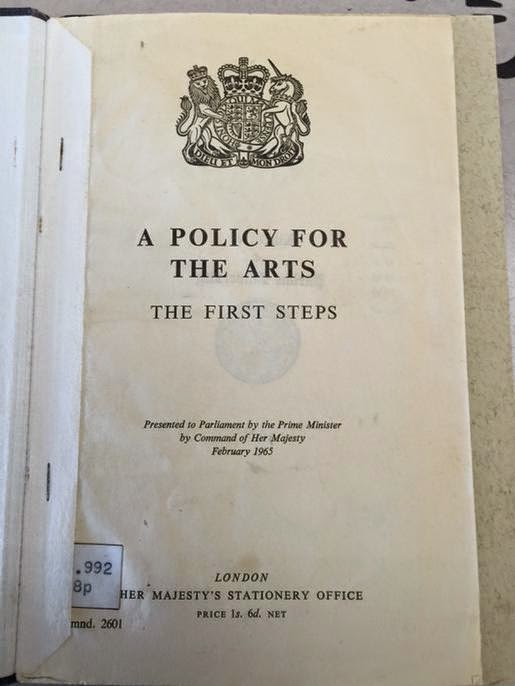 |
| Jennie Lee |
Wednesday 25th February marked 50 years since Jennie Lee's white paper: A Policy for the Arts - First Steps. Lee was the arts minister in the 1964 Labour government of Harold Wilson, and it was the first (and is so far the only!) white paper that had been written on the arts. In it, she argues that the arts must occupy a central place in British life and be part of everyday life for children and adults, be embedded in our education system, recognised as an important industry, widely accessible, properly funded, and valued by society.
So, 50 years have passed. How far have we come? Mid February saw the publication of Warwick Commission's report on The Future of Cultural Value, which - although demonstrating that the arts are a significant contributor to the economy - also shows that arts and culture are being 'systematically removed from the UK education system'. Under our current government, the Education Secretary, Nicky Morgan, has said that 'Arts subjects limit career choices'; we've watched Arts subjects being devalued, undermined and squeezed out of the curriculum, and at the same time provision outside of formal education reduced and dismantled due to funding cuts (from a regime of austerity which consistently harms the younger generation). As Paul Collard, Chief Executive at Creative Culture and Education, recently said:
'What is clear now is that young people, especially those in the less affluent areas, are not getting any opportunities at all, because arts... access for young people has been swept away. And it will only get worse.'
Cheerful reading. So, what shall we do? Make some noise! Make some art! DO SOMETHING! That was the call of Devoted and Disgruntled, spear-headed by Stella Duffy. With a twitter handle #ArtsPolicy50 ready to go viral (which, YAY, on 25/02/15 it DID!), the mission was clear: mark the anniversary; let people know why you think it's important; make a fuss.
I think it's important, so I celebrated, discussed and responded with two groups I was working with that week: a group of adults in recovery from various forms of addiction, who I do Creative Writing with at The Living Room, and a group of young migrant/refugee teenagers in South London, who I do Drama with for Attic Theatre Company.
With my group at The Living Room, I decided to challenge both them and myself, and worked with them to write a group villanelle. A villanelle is a poetic form that is supposed to be one of the very hardest to write, and I thought this would not only give my group a lift, knowing how capable and talented they are, once we had written one, but would also be a nice way of demonstrating that a community group, gathered together for the purpose of recovery (rather than because they had chosen to attend an arts-based class) could be damn creative, that the arts could be of value to ANY community. And they did bloody well, so I'm going to let their work provide all the evidence I need....
Arts for All
We feel as if we're up against the wall,
This generation is under duress.
Art is for everyone. Art is for us all.
So we shall answer our heart's secret call
With a tight grip or with a sweet caress.
We feel as if we're up against the wall.
We know we're got the gumption and the gall
The talent, deep inside us, to impress.
Art is for everyone. Art is for us all.
It's not as if the order's very tall,
We're tired of giving more and getting less.
We feel as if we're up against the wall
From Cornish coast up to remote Rockall
We will push for proper, fair access.
Art is for everyone. Art is for us all.
Inside our schools and every village hall.
Fifty year's since Jennie Lee's address,
We feel as if we're up against the wall.
Art is for everyone. Art is for us all.
Before they left, many of them said they had felt 'lifted' by the experience, that they were 'proud' of what they'd achieved, that they felt 'lighter', 'invigorated', that they'd had 'fun'. Arts for all. It does matter.
Then on the day itself, I ran our Drama group with my colleague, Rob Lehmann, at SCOLA, with the young migrants. Many of the students have very little English, and come from all across the globe. Some have come from war-torn countries, some have Post-Traumatic Stress Disorder, most are in foster care. All agreed the arts are a fundamental part of their lives. We we had some fun, took some photos, and celebrated the importance of the arts in all of their lives.










